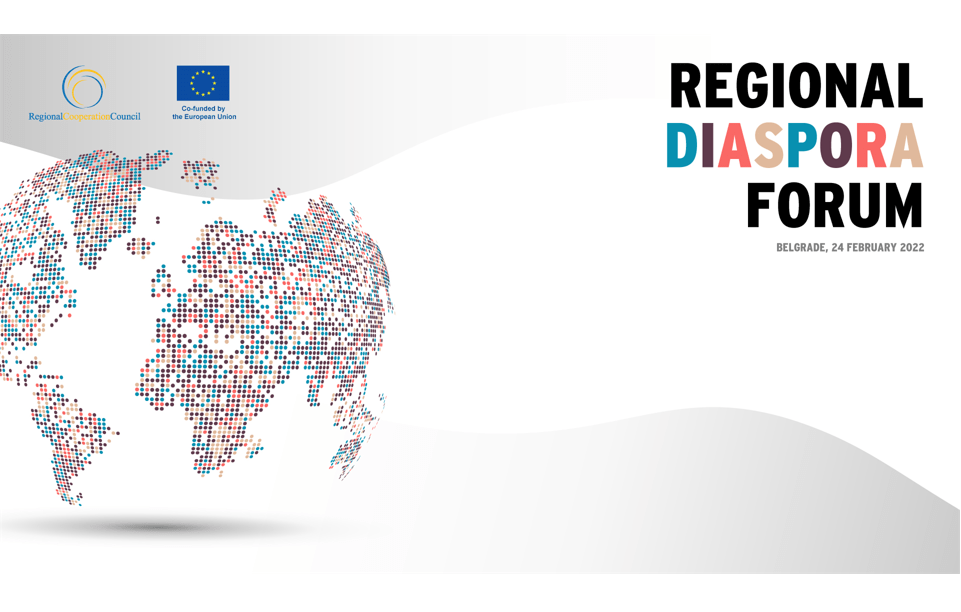First Regional Diaspora Forum Brings Key Stakeholders

The first Regional Diaspora Forum focusing on the Western Balkans was held in Belgrade and online on 24 February 2022.
The event allowed regional networking of participants from the entire Western Balkans.
After the welcome session, the Forum featured an exclusive presentation of the Compendium on Best Practices in Diaspora Engagement in the Western Balkans prepared by the Regional Cooperation Council.
The three-panel discussion featured interesting participants from various fields including international organisations, foundations, businesses, scholars and youth representatives.
The Forum was one of the actions of the Regional Diaspora Knowledge Transfer Initiative in the Western Balkans that was launched in 2021.
An overview of the Western Balkans' Diaspora
According to statistics, the Western Balkans has approximately 17.5 million residents with a 7 million-strong diaspora (61% of residents). Studies confirm that the number of the region's citizens seeking residence in the EU over the past decade has been steadily rising.
Close to 6 million first permits were issued by EU/EFTA Member States over the last decade. The most ‘popular’ EU countries for emigrants are Germany, Italy and Greece.
It's worth noting that the population in the Western Balkans has contracted by almost 1 million during the same period.
The region's governments have started to understand the importance of the diaspora. Therefore, all governments have created strategic frameworks focusing on the diaspora, while four out of six economies in the region have also introduced legislative frameworks.
In addition, local governments are starting to understand that matching the diaspora's needs with their needs could be a win-win scenario to drive economic development, in particular among less-developed local communities.
Among engaged diaspora members, the most frequent categories are innovators, transnational entrepreneurs, mentors, scientists and researchers.
First Regional Diaspora Forum Conclusions
The region’s diaspora offers numerous opportunities that the Western Balkans could tap into and utilize in the future. The Forum is a powerful way to promote the potential of the region’s diaspora and exchange regionally scalable ideas.
The discussions showcased various approaches to tackling the diaspora ranging from hybrid (Returning Point/Tacka povratka, Serbia) to project-based initiatives to student-led (OMSA) or diaspora-led (Macedonia 2025). The scale of supported actions in the region range from a total of $6.6 mill (BiH) to 30,000 EUR annually (MNE).
The focus in the future should be on designing diaspora policy actions around the needs of the diaspora, rather than designing policy instruments that sit in a vacuum.
Also, the region should invest focused efforts into:
- matching the diaspora with local communities back home, and research/innovation practitioners and youth,
- programmes that leverage the power of digital transformation including skilling and upskilling,
- heavy promotion of diaspora-related initiatives in the future to ensure outreach,
- practical actions the diaspora can identify with, rather than overly ambitious actions that usually lead towards bottlenecks,
- initiatives that turn brain drain into brain circulation between the home and host communities.
All the above should lead to reestablishing true partner relations between the diaspora and home communities, and trustworthy relations.
Future actions of the Regional Diaspora Knowledge Transfer Initiative
In terms of potential new regional actions or scaling the existing success stories, the Forum has seen three possible areas for regional engagement:
-
- diaspora scientific and innovation cooperation
- mentorship/internship programs
- diaspora sourcing initiative (bringing investors in).
Each of the above actions has strong and weak sides.
The most likely contender would be the first action on matching scientists and innovation practitioners. If well developed and implemented, it could showcase the region's diaspora potential. This could, in turn, encourage more ambitious actions such as regional investment schemes targeting the diaspora.
